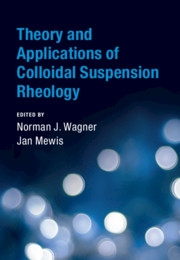Book contents
- Theory and Applications of Colloidal Suspension Rheology
- Cambridge Series in Chemical Engineering
- Theory and Applications of Colloidal Suspension Rheology
- Copyright page
- Dedication
- Contents
- Contributors
- Preface
- General List of Symbols
- Useful Physical Constants and Values
- 1 Introduction to Colloidal Suspension Rheology
- 2 Theory of Colloidal Suspension Structure, Dynamics, and Rheology
- 3 Methods of Colloidal Simulation
- 4 Microstructure under Flow
- 5 Rheology of Colloidal Glasses and Gels
- 6 Suspensions of Soft Colloidal Particles
- 7 Biocolloid Rheology
- 8 Hemorheology
- 9 Applications
- Index
- References
7 - Biocolloid Rheology
Published online by Cambridge University Press: 07 April 2021
- Theory and Applications of Colloidal Suspension Rheology
- Cambridge Series in Chemical Engineering
- Theory and Applications of Colloidal Suspension Rheology
- Copyright page
- Dedication
- Contents
- Contributors
- Preface
- General List of Symbols
- Useful Physical Constants and Values
- 1 Introduction to Colloidal Suspension Rheology
- 2 Theory of Colloidal Suspension Structure, Dynamics, and Rheology
- 3 Methods of Colloidal Simulation
- 4 Microstructure under Flow
- 5 Rheology of Colloidal Glasses and Gels
- 6 Suspensions of Soft Colloidal Particles
- 7 Biocolloid Rheology
- 8 Hemorheology
- 9 Applications
- Index
- References
Summary
This chapter applies the fundamental framework for colloidal forces and rheology to biocolloids. We define biocolloids broadly as colloidal assemblies with primary applications that are biomedical in nature, e.g., (i) block copolymers used in pharmaceutical formulations and biomaterials applications, and (ii) biomacromolecules that can be reasonably described with colloidal descriptions for the interparticle interactions; namely globular proteins and protein assemblies such as casein micelles. Our discussion mainly focuses on systems where concepts from colloidal interactions prove useful in interpreting the rheological behavior. The chapter briefly discusses the importance of colloidal rheology to applications in drug delivery, biomolecular therapeutics, and foods. Examples from both classic publications and recent literature are provided, along with models to describe the rheological behavior. Specific systems discussed include thermoresponsive micellar block copolymers, associative polymers, biomimetic block copolymer assemblies with stereocomplexes and crystalline domains as well as globular proteins.
- Type
- Chapter
- Information
- Theory and Applications of Colloidal Suspension Rheology , pp. 291 - 315Publisher: Cambridge University PressPrint publication year: 2021

